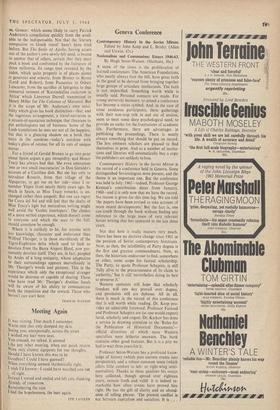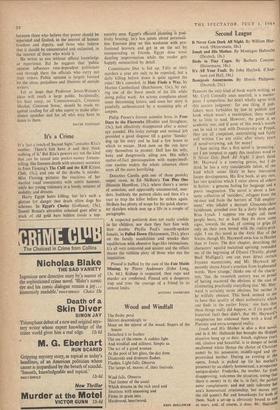Geneva Conference
Nationalism and Communism: Essays 1946-63. By Hugh Seton-Watson. (Methuen, 36s.) A MARK of the times is the proliferation of learned conferences. The American Foundations, who nearly always foot the bill, have great faith in the good to be derived from bringing together large groups of articulate intellectuals. The faith is not unjustified. Something worth while is usually said. Personal contacts are made. For young university lecturers, to attend a conference has become a status symbol. And, in the case of some assiduous participants, these gatherings with their non-stop talk in and out of session, seem to meet some deep psychological need, to provide an outlet for the frustrations of academic life. Furthermore, there are advantages in publishing the proceedings. There is nearly always something that should be put on record. The less eminent scholars are pleased to find themselves in print. And as a number of institu- tions and libraries will automatically buy a copy the publishers are unlikely to lose.
Contemporary History in the Soviet Mirror is the record of a conference held in Geneva. Some distinguished Sovietologists were present, and the theme is an important one. But the conference was held in July, 1961—indeed, Professor George Kennan's contribution dates from January, 1960—and it is only now that we have the record. No reason is given for this time lag. We are told 'the papers have been revised to take account of more recent developments.' But the fact is, one can comb through the book without finding any reference to the large mass of very relevant Soviet writing that has appeared in the last three years.
Not that here it really matters very much. There has been no decisive change since 1961 in the position of Soviet contemporary histcirians. Now, as then, the infallibility of Party dogma is the first and greatest commandment. Now, as then, the historians endeavour to find, somewhere or other, some scope for factual scholarship. The Party, to quote Professor Schapiro, is still 'fully alive to the precariousness of its claim to 'authority,' but is still 'nevertheless doing its best to preserve it.'
Western optimists still hope that scholarly freedom will one and pessimists still day are prevail dubious. over dogma, All in all, there is much in the record of this conference that is still worth while reading. Dr. Keep pro- vides an admirable foreword. Professor Fainsod and Professor Schapiro are (as one would expect) lucid, scholarly and cogent. Dr. Katkov has done a seryice in drawing attention to the 'Rules for the Publication of Historical Documents'— official directives of which most Western specialists were hitherto unaware. The book contains other good features. But it is a pity we had to wait three years for it.
Professor Seton-Watson has a profound know- ledge of history (which puts current events into perspective), and a robust common sense (which offers little comfort to left- or right-wing senti- mentalists). Thanks to these qualities his essays here collected, though spread over eighteen years, remain fresh and valid: it is indeed re- markable how often events have proved him right. He has the gift of clarity and an abund- ance of telling phrase: 'The present conflict is not between capitalism and socialism. It is . . .
between those who believe that power should be separated and limited, in the interest of human freedom and dignity, and those who believe that it should be concentrated and unlimited, in the interest of those who wield it.'
He writes as one without official knowledge or experience. But he suggests that `public opinion influences vote-dependent politicians and through them the officials who carry out their orders. Public opinion is largely formed by the ideas, prejudices and illusions of outside writers.'
Let us hope that Professor Seton-Watson's ideas will reach a large public. Incidentally, his final essay, on `Commonwealth, Common Market, Common Sense,' should be made re- quired reading for all who aspire to make after- dinner speeches and for all who may have to listen to them.
DAVID FOOTMAN































 Previous page
Previous page